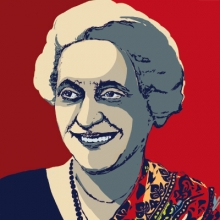Indira was born in an aristocratic family. She was a beloved daughter and learner of her father, Jawaharlal Nehru, the leader of the Indian National Congress. Her mother, Kamala Nehru, in contrast with her husband, was a very religious and traditional person. She did not want to get involved in politics.
The European-style house of Nehru was the headquarters of the anti-civil obedience movement. Many nationalists came to her house, e.g. Mahatma Gandhi. A little Indira was prepared to have her father incarcerated by the British at any time.
Educated in the best schools (Shantiniketan, Oxford), she decided to marry Feroz Gandhi against her father’s will (Feroz Gandhi was not related with Mahatma Gandhi). After she gave birth to two sons, she decided to leave her husband, move in to her father’s house in Dehli and get involved in the struggle for independent India. She was an official host and Nehra’s closest life companion. Together with Nehru, she visited foreign governments and courts. She became his main advisor. In 1959, she was chosen the head of the Indian National Congress.
At the time, Indira was shy and lacked self-confidence. She admitted in public that she was not competent enough to inherit her father’s legacy. However, after Nehru’s sudden death in 1964, she was expected to enter the world of politics. She became a minister of information and media. This post gave her priceless knowledge and experience, which later, helped her use media to create her own image.
Indira’s apparent weakness constituted her power. Only two years later, in the face of the death of the then prime minister, she began a fight against the conservative wing of her own party, which she later won. She defended her position as a leader of Indian National Congress and in 1966 she became prime minister of India.
Indira enjoyed the strong support of women, youth and the poorest of the socialist part of Indian society. She prevented famine all over India. She knew the world of international affairs very well; she was an honorary guest both in Washington and Moscow.
Her cabinets were weak and for the most part, dependent upon her. She was a strict ruler who wanted to introduce, in her opinion, an ideal socialist model of society in India and solve the problem of poverty and unemployment.
In 1971, she was elected Prime Minister again. However, the opposition accused her of falsifying the elections. The war with Pakistan, which she won in 1971, did not bring her more supporters either. The Supreme Court recalled her and she lost her seat in the Parliament.
Indira Gandhi did not yield and announced the Emergency becoming an authoritarian ruler. The time of Gandhi’s dictatorship came. Her political opponents were sent to prison, opposition newspapers were closed down. The Prime Minister effectively changed the law so that it protected her after the Emergency was called off. In 1980, she was elected Prime Minister again, but this time she refrained from authoritarianism.
However, she had many enemies among whom were the Sikhs. Against their separatist aspirations, she fought in an especially ruthless way. Her most brutal military action was an attack on the Golden Temple in Amritsar. The main leader of the Sikhs and his 600 supporters were killed. In revenge for the Operation Blue Star, a group of Sikhs carried out an attack on the life of Indira Gandhi. She died in 1984 after having been shot by her own security guard.
When she was still alive, a myth of Indira Gandhi as another Indian goddess in the image of Durga, the goddess of war, was promulgated. She won elections four times and dominated Indian politics for two decades, while at the same time most women in India were not aware of the rights that they had thanks to the constitution which was created by Indira’s father.
In a talk with the British prime minister, Margaret Thatcher, she allegedly admitted that women have to work harder than men to achieve the same position. She claimed, however, that in her case, her sex was not an obstacle in her political career.
She was neither a suffragette, nor a feminist. She did not see a difference between the problems of poor women and poor men in India. She never worked directly for the benefit of women. However, she paved the way for them.

